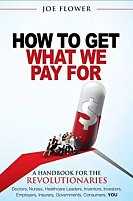With over 30 years' experience, Joe Flower has emerged as a premier observer and thought leader on the deep forces changing healthcare in the United States and around the world. As a healthcare speaker, writer and consultant, he has explored the future of healthcare nationally and internationally, with clients ranging from the World Health Organization, the Global Business Network and the U.K. National Health Service, to the majority of state hospital associations in the U.S. as well as many of the provincial associations and ministries in Canada, and an extraordinary variety of other players across healthcare - professional associations, pharmaceutical companies, device manufacturers, health plans, physician groups, and numerous hospitals.
Flower continues to consult to organizations that have included the U.S. Department of Defense, Airbus, and ArianeSpace, a number of governments in China, and with big and small organizations, entrepreneurs, and individuals, helping clients to identify market opportunities and advising the transformation they find necessary for doing business in this historic moment of national and global change in the healthcare industry.
Flower is the author of How To Get What We Pay For: A Handbook for the Revolutionaries - Doctors, Nurses, Healthcare Leaders, Inventors, Investors, Employers, Insurers, Governments, Consumers, You. It is a true manual for how each of us can get much better, much cheaper healthcare for ourselves, our families, while revolutionizing the system at the same time. Flower details how healthcare leaders and other readers can and already are shaping the Next Healthcare in the decisions they are now making as they sell into, invest in, manage, and buy healthcare. He offers a unique, comprehensive framework for understanding the transformation underway and how to make intelligent and strategic choices for oneself and for one's organization. How To Get What We Pay For paints the big picture of how healthcare works and how it is changing and why, building on his previous work, Healthcare Beyond Reform: Doing it Right for Half the Cost, a widely acclaimed manifesto on where healthcare is and has to be heading, based on his in-depth survey of healthcare trends and innovation.
Underpinning much of Flower's writing is his extensive research into leadership and the change process for which he interviewed over 60 top thinkers on organizational change, from Peter Drucker to Peter Senge and Ari de Geus. This took him into the study of chaos theory, Eastern thought and martial arts. He eventually earned a black belt in Ueshiba Aikido.
Flower was a contributing writer for Wired Magazine in its explosive early years, and a columnist for the pioneering health websites DNA.com and HealthCentral.com. Joe was also a founding member of the International Health Futures Network and the principal author of the landmark healthcare forecast, "Technological Advances and the Next 50 Years of Cardiology,"Journal of the American College of Cardiology (vol. 35, no. 4, 2000).
Flower received his B.A. from UC Santa Barbara, and his MA from San Francisco State University.
Flower continues to consult to organizations that have included the U.S. Department of Defense, Airbus, and ArianeSpace, a number of governments in China, and with big and small organizations, entrepreneurs, and individuals, helping clients to identify market opportunities and advising the transformation they find necessary for doing business in this historic moment of national and global change in the healthcare industry.
Flower is the author of How To Get What We Pay For: A Handbook for the Revolutionaries - Doctors, Nurses, Healthcare Leaders, Inventors, Investors, Employers, Insurers, Governments, Consumers, You. It is a true manual for how each of us can get much better, much cheaper healthcare for ourselves, our families, while revolutionizing the system at the same time. Flower details how healthcare leaders and other readers can and already are shaping the Next Healthcare in the decisions they are now making as they sell into, invest in, manage, and buy healthcare. He offers a unique, comprehensive framework for understanding the transformation underway and how to make intelligent and strategic choices for oneself and for one's organization. How To Get What We Pay For paints the big picture of how healthcare works and how it is changing and why, building on his previous work, Healthcare Beyond Reform: Doing it Right for Half the Cost, a widely acclaimed manifesto on where healthcare is and has to be heading, based on his in-depth survey of healthcare trends and innovation.
Underpinning much of Flower's writing is his extensive research into leadership and the change process for which he interviewed over 60 top thinkers on organizational change, from Peter Drucker to Peter Senge and Ari de Geus. This took him into the study of chaos theory, Eastern thought and martial arts. He eventually earned a black belt in Ueshiba Aikido.
Flower was a contributing writer for Wired Magazine in its explosive early years, and a columnist for the pioneering health websites DNA.com and HealthCentral.com. Joe was also a founding member of the International Health Futures Network and the principal author of the landmark healthcare forecast, "Technological Advances and the Next 50 Years of Cardiology,"Journal of the American College of Cardiology (vol. 35, no. 4, 2000).
Flower received his B.A. from UC Santa Barbara, and his MA from San Francisco State University.
Programs |
How To Get What We Pay For: A Handbook for the Revolutionaries
Healthcare is changing rapidly - but into what? Flower's new 2015 book, explains how getting healthcare to the tipping point where the entire system becomes both much better and vastly cheaper is an all-hands-on-deck exercise. It's not something we can leave to Washington, or to healthcare leaders alone. It calls for action by clinicians, healthcare leaders and insurers, but also employers, investors, state and local governments, and even ordinary voters, patients, and consumers - you. And on the way we can all get better healthcare for less. Here's the playbook and the toolkit: to-dos, checklists, resources, and Flower's uniquely clear and actionable Big Picture. The New Healthcare Revolutionaries: Employers, Investors, Municipalities, Consumers, You If you are purchasers of healthcare, or investors, if you're a consumer group buying health coverage, or local governments making planning decisions you need to understand the historically unique moment in healthcare that you're operating in now. If you want both much lower costs and much better care, you have to know how the choices you make now determine what will available to you in one year, three years, five years. Healthcare organizations, whether insurers, hospital systems, group practices, even health tech manufacturers, are undergoing massive changes and are looking for new ways to do business. Find out what drives them. Discover the impressive superpowers that you - employers, state and local governments, communities, and consumers - have available to you as soon as you unlock them. Volume to Value: The Path to the New World of Healthcare - We're going there: Everyone agrees that bit by bit, by leaps and slides, we are abandoning fee-for-service and moving toward "value-based purchasing." We are changing the entire basis of the business of healthcare, the revenue flows and cost structures that have kept us alive up until now. But what does "volume to value" mean exactly? What are the steps toward getting to value? How do we survive the transition? What does this Promised Land even look like? How will we know when we are there? What are the challenges, what are the metrics, which are the best models for your particular organization to follow? How can you tell you're succeeding? Who will be your allies? Perhaps most important, how can you help your team, your leadership, your people to move in concert in the right direction? Follow the Money: Tracking What's Working and What's Not In the Shift from Volume to Value We are moving from "volume to value," from fee-for-service to various kinds of risk-based contracts, value-based purchasing and accountable care financial structures. Fine. The revenue flows, cost structures, capital requirements of the Next Healthcare are completely different and vastly more complex than the ways that we are trained in and have experience with. How do you know when you're making money? How do you know when you're just burning your seed corn? How do you leverage legacy investments in plant, personnel, and tech? How do you forecast next year, let alone five years from now? Most importantly, the systemic feedback loops can be confounding, as success with population health management can seriously cut into acute and ED revenues, for instance - but by how much? How soon? Healthcare 2020-2030: Imagining a Day in the Life of the Next Healthcare We are going somewhere fast in healthcare. "Volume to value," new patient-centered tech, big data, population health management, seamless coordination - what will it look like if all these reforms and tech shifts actually work? Does the whole thing actually work? What does the Next Healthcare look like, day to day, for clinicians, healthcare leaders, patients, parents, employers? In this talk we take the imaginative journey and you'll learn how to make the choices that will get you where you want to go. FutureDoc 2020-2030: A Day in the Life - In 2015 we are re-defining what it means to be doctor in ways that are both astonishingly futuristic and classical. How different will it be? How will you make a living? Will it ever get easier? What will tech do the job? What parts of the job will be turned over to robots, sensors, and algorithms? Take a tour of the future in detail in the actual workflow of doctors ten years or more in the future. Getting to Seamless: What Does it Take? - Much of the "volume to value" image is built on seamless care coordination within and between organizations, regions, and levels of healthcare. Most organizations have trouble being transparent even to themselves. Many organizations have neither the capacity nor the inclination to truly build broad teamwork and seamless care flow. Is anyone doing it right? What does that look like? What are the elements, technically and organizationally? What's it take? Smart Behavioral Health Care: A Key to Driving Costs Down and Quality Up If you are looking for savings, that's where the money is. If you are looking for better, earlier, more effective healthcare, that's where the big opportunities are. Mental and behavioral health have to form a big piece of any strategy for building better and cheaper healthcare - but most of us are doing it wrong. Here's how to do it right. |
Video |
|
Books |
|




